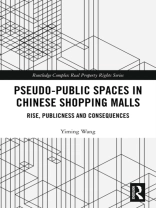Shopping malls in China create a new pseudo-public urban space which is under the control of private or quasi-public power structure. As they are open for public use, mediated by the co-mingling of private property rights and public meanings of urban space, the rise, publicness and consequences of the boom in the construction of shopping malls raises major questions in spatial political economy and magnifies existing theoretical debates between the natural and conventional schools of property rights.In examining these issues this book develops a theoretical framework starting with a critique of the socio-spatial debate between two influential bodies of work represented by the work of Henri Lefebvre and David Harvey. Drawing on the framework, the book examines why pseudo-public spaces have been growing so rapidly in China since the 1980s; assesses to what degree pseudo-public spaces are public, and how they affect the publicness of Chinese cities; and explores the consequences of their rise.Findings of this book provide insights that can help to better understand Chinese urbanism and also have the potential to inform urban policy in China. This book will be of interest to academics and researchers in both Chinese studies and urban studies.
Yiming Wang
Pseudo-Public Spaces in Chinese Shopping Malls [PDF ebook]
Rise, Publicness and Consequences
Pseudo-Public Spaces in Chinese Shopping Malls [PDF ebook]
Rise, Publicness and Consequences
Mua cuốn sách điện tử này và nhận thêm 1 cuốn MIỄN PHÍ!
Ngôn ngữ Anh ● định dạng PDF ● Trang 258 ● ISBN 9780429512544 ● Nhà xuất bản CRC Press ● Được phát hành 2019 ● Có thể tải xuống 3 lần ● Tiền tệ EUR ● TÔI 7033482 ● Sao chép bảo vệ Adobe DRM
Yêu cầu trình đọc ebook có khả năng DRM












